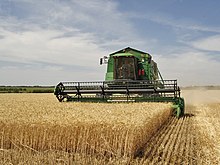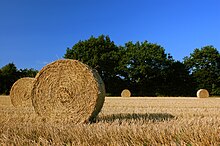Harvest
This article needs additional citations for verification. (May 2008) |


Harvesting is the process of collecting plants, animals, or fish (as well as fungi) as food,
The completion of harvesting marks the end of the growing season, or the growing cycle for a particular crop, and the social importance of this event makes it the focus of seasonal celebrations such as harvest festivals, found in many cultures and religions.
Etymology
"
Crop failure
Crop failure (also known as harvest failure) is an absent or greatly diminished crop yield relative to expectation, caused by the plants being damaged, killed, or destroyed, or affected in some way that they fail to form edible fruit, seeds, or leaves in their expected abundance.
Crop failures can be caused by catastrophic events such as
In history, crop failures and subsequent
The proliferation of
Other uses

Harvesting commonly refers to
In a non-agricultural sense, the word "harvesting" is an economic principle which is known as an exit event or liquidity event. For example, if a person or business was to cash out of an ownership position in a company or eliminate their investment in a product, it is known as a harvest strategy.[6]
Canada
Harvesting or Domestic Harvesting in Canada refers to hunting, fishing, and plant gathering by
Gallery
-
HarvestingSouth Savonia, Finland
-
Rye harvest on Gotland, Sweden, 1900–1910.
-
Sugar beet harvester. Baden-Württemberg, Germany.
-
HarvestingLand of Valencia, 1953.
See also
- Combine harvester
- Harvest (wine)
- Harvest festival
- Overharvesting
- Threshing
- Winnowing
References
- Cambridge Dictionary. Retrieved Aug 17, 2023.
- ISBN 0-618-08230-1.
- ^ "Belts For Seedling Harvesting - Belt Corporation of America". Belt Corporation of America. 2017-04-18. Archived from the original on 2017-08-24. Retrieved 2017-08-23.
- ^ Proceedings of the Philological Society, vol. 5, p. 207.
- ^ Food and Agriculture Organization of the United Nations, Impact of Cultivation and Gathering of Medicinal Plants on Biodiversity: Global Trends and Issues: Appendix 1, Table 7, October 2002, accessed 29 January 2024
- ^ Staff, Investopedia (2011-01-09). "Harvest Strategy". Investopedia. Retrieved 2017-08-23.
- ^ "Gwich'in Comprehensive Land Claim Agreement". Aboriginal Affairs and Northern Development Canada website. Archived from the original on 2004-05-29.
- ^ "Tlicho Agreemen". Aboriginal Affairs and Northern Development Canada website. Archived from the original on 2012-07-14. Retrieved 2012-03-19.




